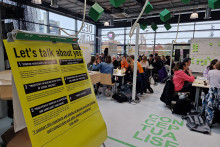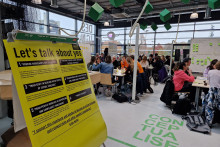Since August 2021, Amnesty has been asking higher education institutions to sign a manifesto against sexual violence among students. A survey carried out by the human rights organisation has revealed that rape occurs relatively frequently among students and that the majority do not know where to go for help at their institution after experiencing sexual violence.
Recent surveys by the Dutch National Students’ Association and the Inspectorate of Education have confirmed that victims of ‘unsafe situations’ frequently do not report the matter, so problems sometimes remain off the radar.
Workshops and training courses
The manifesto contains six action points. For example, there need to be workshops that students can attend, such as bystander training. And staff should be trained to be ‘trauma-sensitive’ when dealing with issues such as sexual violence. Complaints procedures should also be improved.
Last year, Vrije Universiteit Amsterdam was the first to sign, but since then only nine more institutions have followed. The UT is planning to sign the manifesto. Utrecht University decided not to sign the manifesto, but wants to institute its own action plan. Delft University of Technology has not signed because it does not see any great benefit in workshops for all students. That’s a pity, in the view of Janna Willems, an Amnesty campaigner.
Has the bar been set too high for the institutions with the six action points?
‘We get questions like that from the institutions but most of them understand the need these kinds of workshops and training activities. We certainly don’t expect everything to have been settled at the time of signature. It’s only afterwards that we go ahead with the implementation and we can help them with that as well.’
Why have so few institutions signed the manifesto?
‘We expect another 10 institutions to sign within a few weeks and then the total will be 20. What is happening isn’t negative: many institutions want to draw up an action plan before signing. So it takes a bit longer, but then they can demonstrate what they are planning to do.’
Isn’t that what the action points in the manifesto are for?
‘The action points serve as a kind of basis. We are encouraging the institutions to do even more. As an example, HAN University of Applied Sciences did so this week with the ‘Wheel of Student Wellbeing’, and Maastricht University combined its signing ceremony with a conference. These institutions put a lot of thought and effort into things before signing the manifesto, which we see as very positive.’
So there’s no lack of urgency?
‘The institutions certainly feel a sense of urgency, especially following the revelations from The Voice and the student surveys that have been published. They’re getting to grips with it and we have the feeling that the issue is being taken seriously. But we also feel that the time is ripe for more signatures because they have had plenty of time to think about things. It’s an important signal for students and the outside world, so we hope that all the institutions will join in before the next academic year.’







